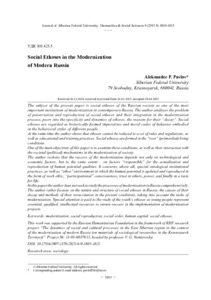Social Ethoses in the Modernization of Modern Russia
Скачать файл:
URI (для ссылок/цитирований):
https://elib.sfu-kras.ru/handle/2311/19792Автор:
Pavlov, Aleksander P.
Павлов, А.П.
Дата:
2015-09Аннотация:
The subject of the present paper is social ethoses of the Russian society as one of the most
important institutions of modernization in contemporary Russia. The author analyzes the problem
of preservation and reproduction of social ethoses and their integration in the modernization
process, peers into the specificity and dynamics of ethoses, the reasons for their “decay”. Social
ethoses are regarded as historically formed imperatives and moral codes of behavior embodied
in the behavioral styles of different people.
At the same time the author shows that ethoses cannot be reduced to a set of rules and regulations, as
well as educational and training practices. Social ethoses are formed in the “root” (primordial) living
conditions.
One of the main objectives of this paper is to examine these conditions, as well as their interaction with
the societal (political) mechanisms in the modernization of society.
The author reckons that the success of the modernization depends not only on technological and
economic factors, but to the same extent – on factors “responsible” for the actualization and
reproduction of human potential qualities. It concerns, above all, special ontological institutional
practices, as well as “ethos” environment in which the human potential is updated and reproduced in
the form of work ethic, “participational” consciousness, trust in others, power, and finally in a taste
for life.
In this paper the author does not seek to study the processes of modernization in Russia comprehensively.
The author rather focuses on the nature and structure of social ethoses in Russia, the causes of their
decay and methods of their resuscitation in the present conditions, taking into account the tasks of
modernization. Special attention is paid to the study of the youth’s ethoses as young people represent
essential, qualified, intellectual resources to ensure success in the implementation of modernization
projects Предмет предлагаемой статьи – социальные этосы российского общества как важнейший
институт модернизации в современной России. В статье анализируется проблема
сохранения и воспроизводства социальных этосов, их включённость в процессы модернизации,
исследуются специфика и динамика этосов, причины их «затухания». Под социальными
этосами автор понимает исторически сложившиеся моральные кодексы и императивы
поведения, воплощенные в стилях поведения людей.
При этом автор показывает, что этосы не сводятся к набору норм и правил, а также
образовательных и воспитательных практик. Социальные этосы формируются в «корневых»
(примордиальных) условиях жизни людей.
Одна из главных задач данной статьи – изучить эти условия, а также их взаимодействие с
социетальными (политическими) механизмами модернизации общества.
Автор показывает, что успех модернизации зависит не только от технологических и
экономических факторов, но в не меньшей степени от таких, которые «отвечают» за
актуализацию и воспроизводство человеческого потенциала. Речь идет, прежде всего,
об особых онтологических институциональных практиках, а также «этосной» среде, в
которой актуализируется и воспроизводится человеческий потенциал в виде трудовой этики,
«участного сознания», доверия к окружающим, к власти, наконец, просто вкус к жизни.
Автор не ставит цель всесторонне изучить процессы модернизации в России. В центре
внимания автора – природа и структура социальных этосов в России, причины их затухания и
способы реанимации в современных условиях с учётом задач модернизации. Особое внимание
в работе уделяется изучению этосов молодежи как важнейшему квалифицированному,
интеллектуальному ресурсу, обеспечивающему успех в реализации модернизационных
проектов
Коллекции:
Метаданные:
Показать полную информациюСвязанные материалы
Показаны похожие ресурсы по названию, автору или тематике.
-
Mechanisms for Social Ties Formation in the Information Environment in Modern Domestic and Foreign Studies
Bereziuk, Svetlana V.; Koptseva, Natalia P.; Fil’ko, Antonina I.; Березюк, С.В.; Копцева, Н.П.; Филько, А.И. (Сибирский федеральный университет. Siberian Federal University, 2020-05)This article discusses the features of the emergence and strengthening of social ties in the studies of Russian scientists and their foreign colleagues. The main emphasis is made on the research studying these processes ... -
Modern Nuclear Plant: Social Risks and Social Security from the Perspective of Post-non-classical Universum Sociology
Kareeva, Anna P.; Кареева, А. П. (Сибирский федеральный университет. Siberian Federal University, 2015-11)The article presents an analysis of social risks with the use of the methodological principle of minimum universum. Social risks are divided between three levels: material-energetic, functional-organizational and ... -
Concept and Structure of a Phenomenon of Spirituality in Modern Religious Studies
Kosolapov, Ruslan A.; Kuybar, Vladimir I.; Косолапов, Р.А.; Куйбарь, В.И. (Сибирский федеральный университет. Siberian Federal University., 2015-09)The social and philosophical understanding of the nature of spirituality which is considered as system of stable relations of the person and society, as a way of the organization and existence of the valuable beginning ... -
The Correction of Self-Image as One of Directions of Work for Preventing Victimization of People with Crippled Body in Modern Russian Society
Nagornaya, Lyubov A.; Nagornyi, Nikolay N.; Нагорная, Л.А.; Нагорный, Н.Н. (Сибирский федеральный университет. Siberian Federal University., 2015-09)The article analyzes the reasons for the victimization of people with mutilated corporeality. It is noted that the conditions of socialization of people in modern Russian society contribute to the formation of victim ... -
Social Functions of Modern Libraries as Cultural Institution
Kachanova, Elena Iu.; Качанова, Е.Ю. (Сибирский федеральный университет. Siberian Federal University, 2016-06)The paper analyzes the social function of libraries in modern society, various approaches to this problem in Russian librarianship. The author characterizes the traditionally recognized social functions of a library ...

